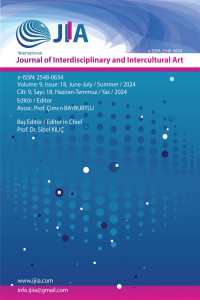FORMAL STRUCTURE AND UNEXPECTED CHANGES IN THE FIRST MOVEMENT OF SAMUEL BARBER’S OPUS 6 CELLO SONATA
Öz
In this study, an analysis was carried out on the first movement of the Opus 6 Cello Sonata by
Samuel Barber, one of the most prominent American composers of the 20th century, based on formal
structure and unexpected changes.
As a result of the literature survey, it is revealed that there are important differences between the
sources examining the formal structure of the movement. For this reason, the movement was
subjected to a formal analysis covering four sub-dimensions which have multiple stages. Then, the
unexpected changes in the movement were examined by following two process steps.
The results of the analysis reveal that there are 10 moments of unexpected changes in the movement.
7 (70%) of them have originated from the harmonic structure, 2 (20%) from the rhythmic structure,
and 1 (10%) from the nuance level. Starting from this point of view, it is clearly seen that the
composer utilized predominantly harmony in creating an unexpected moment of change.
Anahtar Kelimeler
Samuel Barber Opus 6 Cello Sonata Sonata-allegro Unexpected change
Kaynakça
- Broder, N. (1948). The Music of Samuel Barber. The Musical Quarterly, 34 (3), 325-335. Erişim: https://www. jstor.org/stable/739546 (10.12.2023).
- Burrell, K. (2019). Samuel Barber’s Contribution To Twentieth-Century Violoncello Literature. Sanat Projesi, Ball State University, Indiana.
- Ewen, D. (1939). Modern American Composers. The Musical Times, 80(1156), 413-416. Erişim: https://doi. org/10.2307/921387 (10.12.2023).
- Friedewald, R,E. (1957). A Formal and Stylistic Analysis of the Published Music of Samuel Barber. Doktora tezi, State University of Iowa, Iowa.
- Koçaslan, G. (2015). Bir Form İkilemi: Brahms, Opus 83, IV. Yüksek Lisans Tezi, Hacettepe Üniversitesi, Ankara.
- Koçaslan, G, Berki, T. (2016). Müzik Formları Öğretiminde Yeni Bir Yaklaşım: Çok Katmanlı Analiz Şeması. E. Lehimler, K. Çelenk (Ed.). 1. Ulusal Müzik Bilimleri Sempozyumu: 28-29 Nisan 2016 - Bildiriler (s.439-452). Erzurum: Atatürk Üniversitesi Yayınları.
- Laird, P. (1999). Samuel Barber. American Music, 17(2), 238-240. Erişim: https://doi.org/10.2307/3052723 (10.12.2023).
- Leung, A. (2010). Samuel Barber’s Souvenirs: A Comparative Study Of The Solo, Duet, And Orchestral Versions. Doktora tezi, University of Oklahoma, Oklahoma.
- Heyman, B. Samuel Barber, The Composer and His Music. New York: Oxford University Press; 1992.
- Mascho, A. M. (2014). The Romantic American: Research and Analysis of Samuel Barber’s Cello Sonata, Op. 6. Yüksek Lisans tezi, Seoul National University, Seoul.
- Pollack, H. (2000). Samuel Barber, Jean Sibelius, and the Making of an American Romantic. The Musical Quarterly, 84(2), 175-205. Erişim: https://www.jstor.org/stable/742563 (10.12.2023).
- Vest, P. J. (2014). A Practical Study of Samuel Barber’s Sonata for Cello and Piano, Op. 6. Doktora tezi, The University of Memphis, Tennessee.
Öz
Bu çalışmada, 20. yüzyılın en önde gelen Amerikalı bestecilerinden biri olan Samuel Barber’ın Opus
6 Viyolonsel Sonatı’nın ilk bölümü üzerinde biçimsel yapı ve beklenmedik değişimler temelinde bir
analiz gerçekleştirilmiştir.
Yapılan literatür taraması sonucunda, bölümün biçimsel yapısını irdeleyen kaynaklar arasında önemli
farklılıklar bulunmuştur. Bu nedenle bölüm, aşamalı dört alt boyutu kapsayan bir form analizine
tabi tutulmuştur. Ardından, bölümdeki beklenmedik değişimler, iki işlem basamağı izlenerek mercek
altına alınmıştır.
Analiz sonuçları, bölümde beklenmedik değişimin yaşandığı 10 ânın söz konusu olduğunu ortaya
koymaktadır. Bunların 7’si (%70) armonik yapı, 2’si (%20) ritmik yapı, 1’i ise (%10) nüans düzeyi
kökenlidir. Buradan hareketle, bestecinin, beklenmedik değişim ânı yaratmada baskın oranda
armoniden yararlandığı açıkça görülmektedir.
Anahtar Kelimeler
Samuel Barber Opus 6 Viyolonsel Sonatı Sonat-allegro Beklenmedik değişim
Kaynakça
- Broder, N. (1948). The Music of Samuel Barber. The Musical Quarterly, 34 (3), 325-335. Erişim: https://www. jstor.org/stable/739546 (10.12.2023).
- Burrell, K. (2019). Samuel Barber’s Contribution To Twentieth-Century Violoncello Literature. Sanat Projesi, Ball State University, Indiana.
- Ewen, D. (1939). Modern American Composers. The Musical Times, 80(1156), 413-416. Erişim: https://doi. org/10.2307/921387 (10.12.2023).
- Friedewald, R,E. (1957). A Formal and Stylistic Analysis of the Published Music of Samuel Barber. Doktora tezi, State University of Iowa, Iowa.
- Koçaslan, G. (2015). Bir Form İkilemi: Brahms, Opus 83, IV. Yüksek Lisans Tezi, Hacettepe Üniversitesi, Ankara.
- Koçaslan, G, Berki, T. (2016). Müzik Formları Öğretiminde Yeni Bir Yaklaşım: Çok Katmanlı Analiz Şeması. E. Lehimler, K. Çelenk (Ed.). 1. Ulusal Müzik Bilimleri Sempozyumu: 28-29 Nisan 2016 - Bildiriler (s.439-452). Erzurum: Atatürk Üniversitesi Yayınları.
- Laird, P. (1999). Samuel Barber. American Music, 17(2), 238-240. Erişim: https://doi.org/10.2307/3052723 (10.12.2023).
- Leung, A. (2010). Samuel Barber’s Souvenirs: A Comparative Study Of The Solo, Duet, And Orchestral Versions. Doktora tezi, University of Oklahoma, Oklahoma.
- Heyman, B. Samuel Barber, The Composer and His Music. New York: Oxford University Press; 1992.
- Mascho, A. M. (2014). The Romantic American: Research and Analysis of Samuel Barber’s Cello Sonata, Op. 6. Yüksek Lisans tezi, Seoul National University, Seoul.
- Pollack, H. (2000). Samuel Barber, Jean Sibelius, and the Making of an American Romantic. The Musical Quarterly, 84(2), 175-205. Erişim: https://www.jstor.org/stable/742563 (10.12.2023).
- Vest, P. J. (2014). A Practical Study of Samuel Barber’s Sonata for Cello and Piano, Op. 6. Doktora tezi, The University of Memphis, Tennessee.
Ayrıntılar
| Birincil Dil | Türkçe |
|---|---|
| Konular | Güzel Sanatlar |
| Bölüm | Makaleler |
| Yazarlar | |
| Yayımlanma Tarihi | 31 Temmuz 2024 |
| Gönderilme Tarihi | 22 Aralık 2023 |
| Kabul Tarihi | 31 Temmuz 2024 |
| Yayımlandığı Sayı | Yıl 2024 Cilt: 9 Sayı: 18 |


